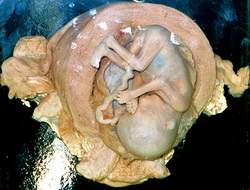What's IVF? IVF is the acronym for in-vitro fertilization which is the process of fertilizing the egg cells from the female by the sperm cells from the male outside the woman's body.

What's IVF?
IVF is considered as a major treatment for couples with infertility problems when other methods of assisted reproductive technology do not work for them. The process involves removing the eggs or ova from the ovaries of the woman after a controlled ovulatory process and then letting it be fertilized by a sperm in a fluid medium. The zygote which is the fertilized egg is then transferred to the uterus of the patient with the goal of creating a fruitful pregnancy.
The first successful birth from the famous test tube baby process happened in the year 1978. The doctor who developed the treatment is Robert Edwards who was recently rewarded the Nobel Prize in Physiology or Medicine last year, 2010. Another successful experiment was reported as well from India. Subash Mukhopadyay performed experiments using simple apparatus and a regular refrigerator. His experimentation eventually resulted to the birth of an IVF baby named Durga on the 3rd day of October 1978.
What's IVF qualification?
Couples become eligible for the IVF treatment if:
- The cause of the infertility problems of the couple has already been identified and/or the infertility problems have been going on for the least of 3 years.
- The age of the woman should be between 23 and 39 (considered the optimum age for conception) in order to apply for the treatment.
Nevertheless the decision for the eligibility is made by the primary care giver and priority is given to couples who never had children. The IVF treatment is usually not recommended to women over the age of 42 since the chances of a fruitful pregnancy are slim in most cases.
What's IVF success rate?
The success rate of having a fruitful conception with the use of IVF largely rests on the age of the woman. Older women have fewer chances for a successful pregnancy compared to younger women because the latter have healthier eggs compared to the former. In recent cases the percentages of the cycles of IVF which resulted to successful live births are:
- 29 percent with women aged below 35
- 26 percent with women aged between 35 and 37
- 17 percent with women aged between 38 and 39
- 11 percent with women aged between 40 and 42
- 5 percent with women aged between 43 and 44
- Less than one percent with women age over 44
Risks linked to IVF
The risks involved with IVF depend on the steps of the procedure.
During ovary stimulation, the ovaries may become painful and swollen. This condition is called Ovarian Hyper Stimulation Syndrome. Egg retrieval carries the risk associated with the use of anesthesia. This may result to infection, bleeding or blood vessel, bladder or bowel damage. Multiple pregnancies are also common in IVF.
Before deciding on IVF, the couple not only needs to be prepared for the aforementioned risks, but also for the possibility of failure. So what's IVF? IVF is a procedure that needs full commitment from the couple, not only financially but physically and emotionally as well.
